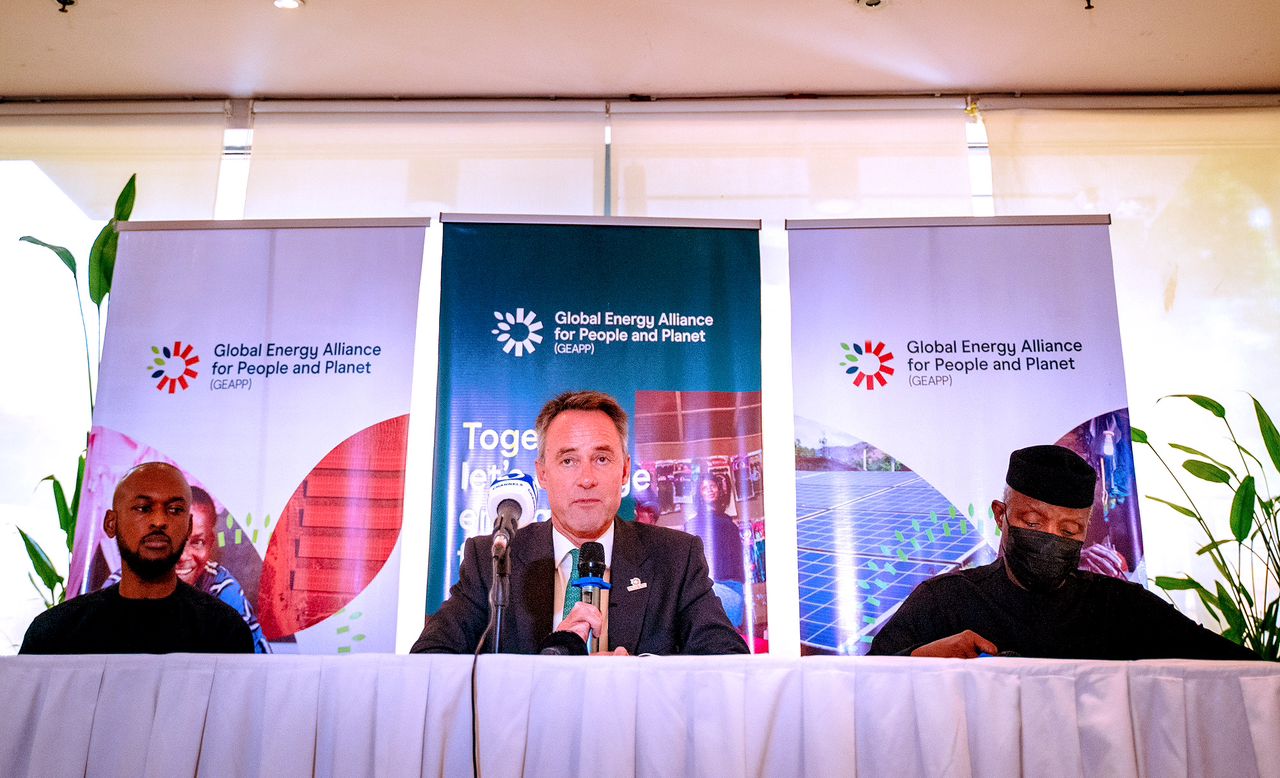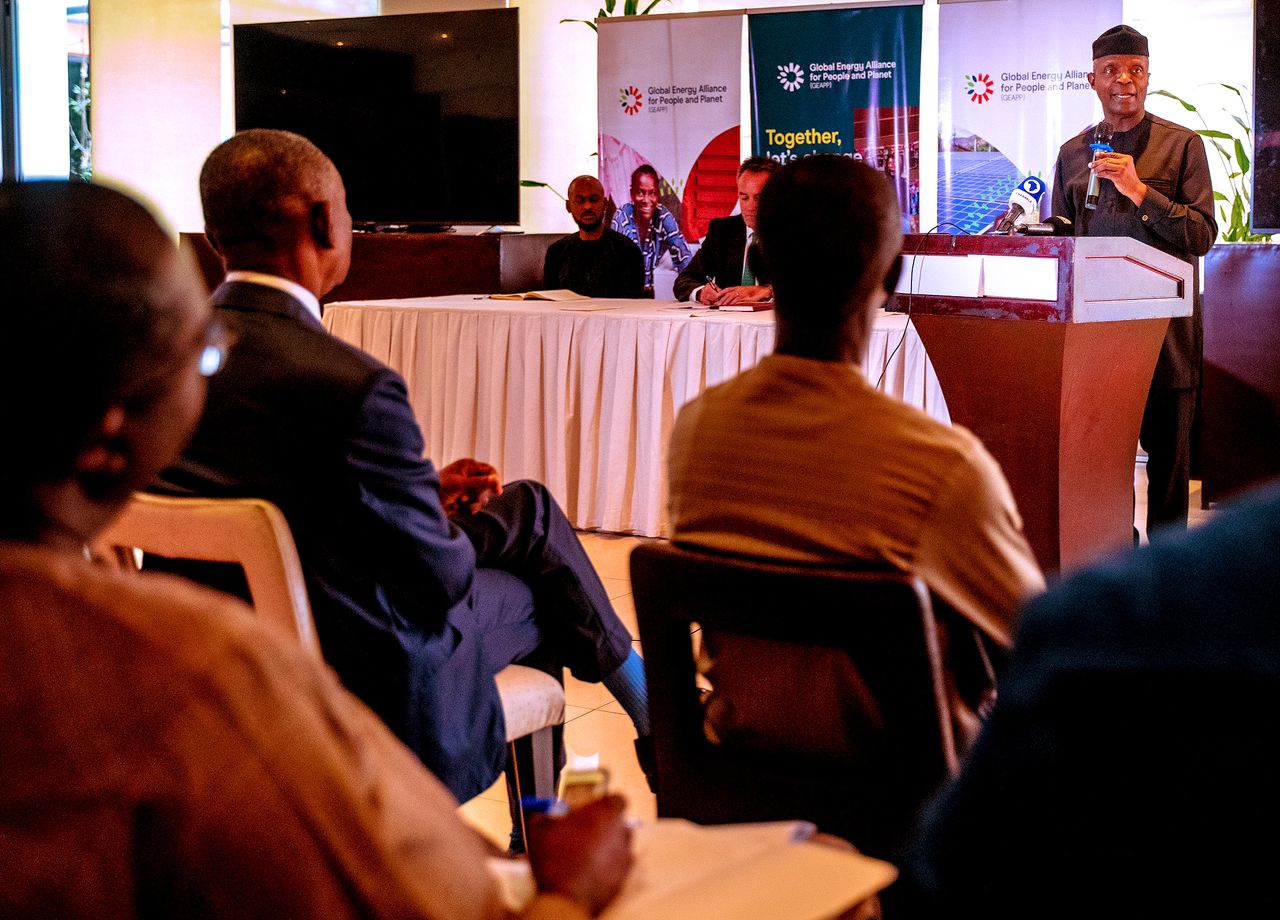The Global Energy Alliance for People and Planet (GEAPP) has announced the appointment of Nigeria’s Former Vice president, Prof. Yemi Osinbajo as Global Advisor to assist GEAPP’s mission of accelerating clean energy deployment in developing countries.
Osinbajo is expected to support GEAPP’s partnership with governments to enhance the enabling environment and delivery effectiveness to unlock faster and greater capital flows into the clean energy sector.
He will also continue his activity as a leading advocate for Just Energy Transitions in Africa including scaling up Africa’s share of the global carbon market via the Africa Carbon Markets Initiative (ACMI).

Harford announcing Osinbajo as advisor
Making the announcement at a press conference in Lagos on Wednesday, GEAPP CEO Simon Harford commented said that the appointment underlines GEAPP’s commitment to partnering with governments and communities across Africa, Asia, Latin America and the Caribbean to transition to clean energy systems that are driving economic growth, generating jobs and sustainable livelihoods, and helping to meet urgent climate goals during the next decade.
“For many years, Osinbajo has been a respected role model of public service at the forefront of policy formulation and implementation on crucial developmental issues relating to national planning, climate change, enabling the business and investment environment, governance, and social investment,” he said.
He explained that the former vp’ professional expertise and leadership, alongside his broad global network and relationships, will be a valuable catalyst in GEAPP’s mission for affordable access to clean energy and a just transition for all, noting that his role begins with immediate effect.
Osinbajo pledges to boost Africa’s share in ACMI
In a series of tweets on Wednesday, Osinbajo said that he will work to unlock capital flows into the clean energy sector and boost Africa’s share in the global carbon market through the Africa Carbon Markets Initiative (ACMI).
The VP said GEAPP, in such a short period, have demonstrated a commitment to support developing countries’ shift to a clean energy using models that ensure universal energy access as well as drive economic growth, generate jobs & sustainable livelihoods and meet urgent climate goals.
He noted that there are several conversations that have highlighted the need for a global energy transition from fossil-fueled based products to more sustainable and ecologically-friendly energy options.
He however regretted what he described as the current inequities developing countries face concerning energy access at different levels.
“Africa could lead the way in tackling climate change by leveraging its renewable energy potential, young workforce, green technologies, carbon removal and green manufacturing,” he said.
“In other words, Africa can provide jobs for millions of its young people, prosper and lead in the fight against climate change by becoming perhaps the first green or carbon-free civilisation. And we have the comparative advantage to do so,” he further stated.

Osinbajo speaking at the conference in Lagos
He maintained that building this climate-positive growth future in the context of a just energy future that includes energy access at all levels and drives economic growth in developing countries requires international consensus, collaboration and investment.
GEAPP on a mission
The Global Energy Alliance for People and Planet (GEAPP) is an alliance of philanthropy, governments in emerging and developed economies, and technology, policy, and financing partners.
Funded by the IKEA Foundation, The Rockefeller Foundation and Bezos Earth Fund, organisation’s common mission is to enable emerging economies to shift to a clean energy, pro-growth model that accelerates universal energy access and inclusive economic growth, while supporting the global community to meet critical climate goals during the next decade.
As an alliance it aims to reduce 4 gigatons of future carbon emissions, expand clean energy access to one billion people, and enable 150 million new jobs. It also works to build the enabling environment, capacity, and market conditions for private sector solutions, catalyse new business models through innovation and entrepreneurship, and deploy high-risk capital to encourage private sector solutions, and assist just transition solutions.
